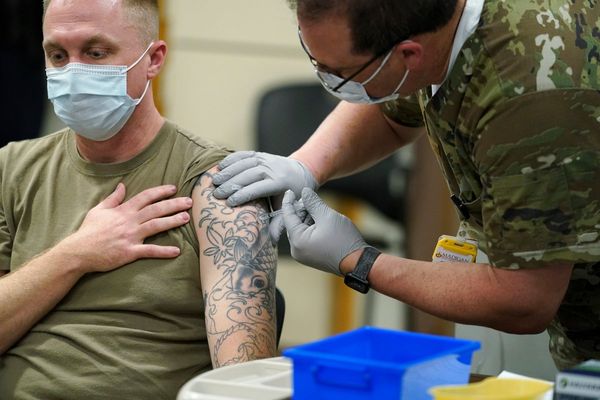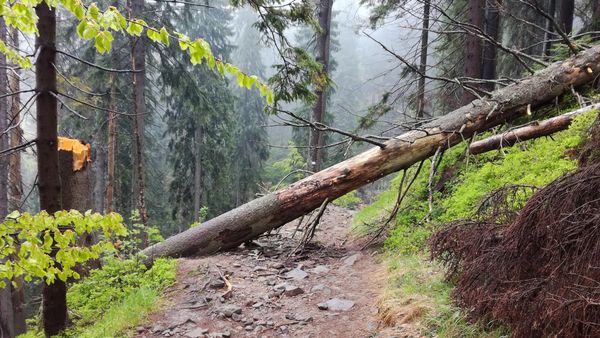
Even before Hurricane Helene knocked down a pine tree in Melissa Hanson’s backyard, crushing the roof above her son’s bedroom in her house in Asheville, North Carolina, she was connecting the storm’s severity to climate change. “This hurricane is tied to our failure to address the climate crisis,” said Hanson, who sheltered with family eight hours away in the Outer Banks so that her children wouldn’t miss school.
Hanson is a climate advocate who recently penned a powerful essay for Scientific American in which she described how some neighbors lost their homes while others “saw their loved ones wash away.” She said she hopes to return to her home soon but schools aren’t expected to open for several more weeks in Asheville.
She said that people in North Carolina “are making that connection between the storm and climate change” given the severity of extreme weather and sea-level rise in recent years. Indeed, climate change increased the storm’s peak rain totals by 10%, according to a new analysis from a multinational team of scientists affiliated with the World Weather Attribution group. There haven’t been polls on the issue since Helene’s destructive fury hit the state in late September, but more than half the respondents in the state to a 2023 survey said they recognize the rise in extreme weather events (59%) and the link to climate change (53%).
Still, Hanson said she doesn’t know if growing climate concern will affect voting behavior or get people to make different choices at the polls in this battleground state. Many of the races in North Carolina’s elections on Nov. 5 will have a climate impact — beyond the razor-thin presidential race. Voters will select a new governor, who will set the state’s climate agenda; pick an attorney general, who will enforce environmental laws; and choose an insurance commissioner, who will determine the rates for homeowners impacted by Helene and future storms.
In the high-profile governor’s race, there is a clear divide on climate, with Mark Robinson, a Republican, supporting the expansion of fossil fuel extraction and the Mountain Valley Southgate natural gas pipeline project. Democratic candidate Josh Stein currently serves as attorney general. He has worked to get the state’s utilities to reduce the use of fossil fuels and to prioritize renewable energy, and has committed to get North Carolina on a path to carbon neutrality by 2050.
But whether Helene moves the needle on climate at the ballot box is an open question.
“It’s a little bit too early for that conversation,” said Jon Council, a house framer who is running for the Watauga County Board of Commissioners as an independent in western North Carolina. “Right now, we’re all focused on recovery.” His home near the Chautauqua River was flooded, and he’s been busy with volunteer crews rescuing neighbors and getting them to safety.
“But I’m very hopeful, holding out hope that having a hurricane in the middle of Appalachia will at least move some people to see that this is clearly caused by human intervention.”
One challenge for voters in North Carolina is containing the flood of misinformation about the hurricane that has inundated the region.
“The biggest battle is this misinformation being put out by our leaders and by influencers on social media — using doctored and AI-generated videos, that Democrats or the government have seeded the storms and control the weather,” Hanson said. “It would be laughable if it wasn’t being taken seriously by a lot of people.”
The pervasive conspiracy theories have caused people “not to come around to agreement on our climate situation,” Council said.
The irony is not lost on either Hanson and Council that climate change’s impact, via Helene, is making it difficult for hard-hit North Carolina residents to focus on the issue or even to get to the polls. Tens of thousands of residents remain without power or water, and the state’s election board recently voted to give voters in western regions of the state more flexibility to vote by mail.
But the damage was almost certain to affect turnout in the election with in-person early voting that started Thursday — and it has already impacted get-out-the-vote efforts. The Environmental Voter Project, which is trying to mobilize 266,000 voters who have expressed climate concerns but have not voted in recent elections, paused its phone and mail outreach to the counties most affected by Helene. The group is encouraged that a slightly higher percentage of these so-called climate voters have voted by mail so far compared to the percent of all registered voters who have done so, said Nathaniel Stinnett, executive director of Environmental Voter Project.
One polarizing factor among would-be voters is the term itself — “climate change” — said Toddi Steelman, professor of environmental and natural resource policy at Duke University. “When we actually focus on what we’re going to do about it, it becomes a lot less polarizing.” She offers the example of residents in the southeastern “Down East” coastal regions, where sea level is rising and flooding is affecting agriculture: “We could be more effective at actually addressing those concerns if we steer away from the language of climate change and really work on the language of resilience and adaptation and addressing the problems where they are,” Steelman said.
Those coastal residents are still recovering from hurricanes in 2018 and 2019 and “They’re voting on the economic issues that affect them day to day — the price of groceries and the rent going up. Not climate change,” she said.
Where climate does show up in elections, Steelman said, is in specific initiatives to create a greener economy, citing Gov. Roy Cooper’s 2020 reelection after signing an executive order that established the goal of a 50% reduction in greenhouse gas emissions by 2030. And there is widespread support for President Biden’s clean-energy initiatives, with 73% of voters in favor of accepting federal funding made available through the Inflation Reduction Act to invest in the state.
But in the wake of Helene, basic economic issues threaten to overwhelm climate concerns. Cooper, for instance, is also criticized by some residents for failing to call for a rent and eviction freeze for struggling residents of the state.
Jazmin Rogers, an Asheville native and a member of the Block Collaborative, a Black landowners group, said the lack of federal and state response and of aid to the poor and working class in the state — before and since Helene — is pushing her and others to sit out the election.
“You’re talking about people whose trailers don’t exist anymore, and if you want to build that trust so that we can actually have a conversation about climate change, ignoring these people is not the way to do it.”







